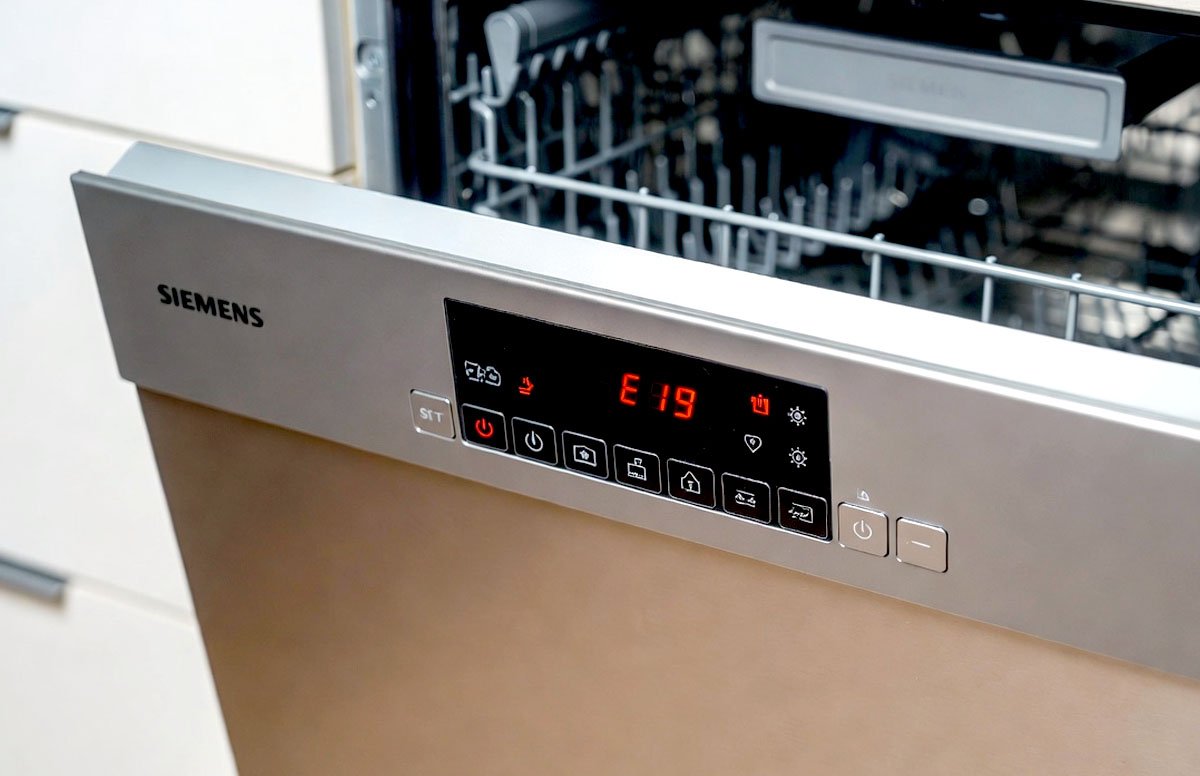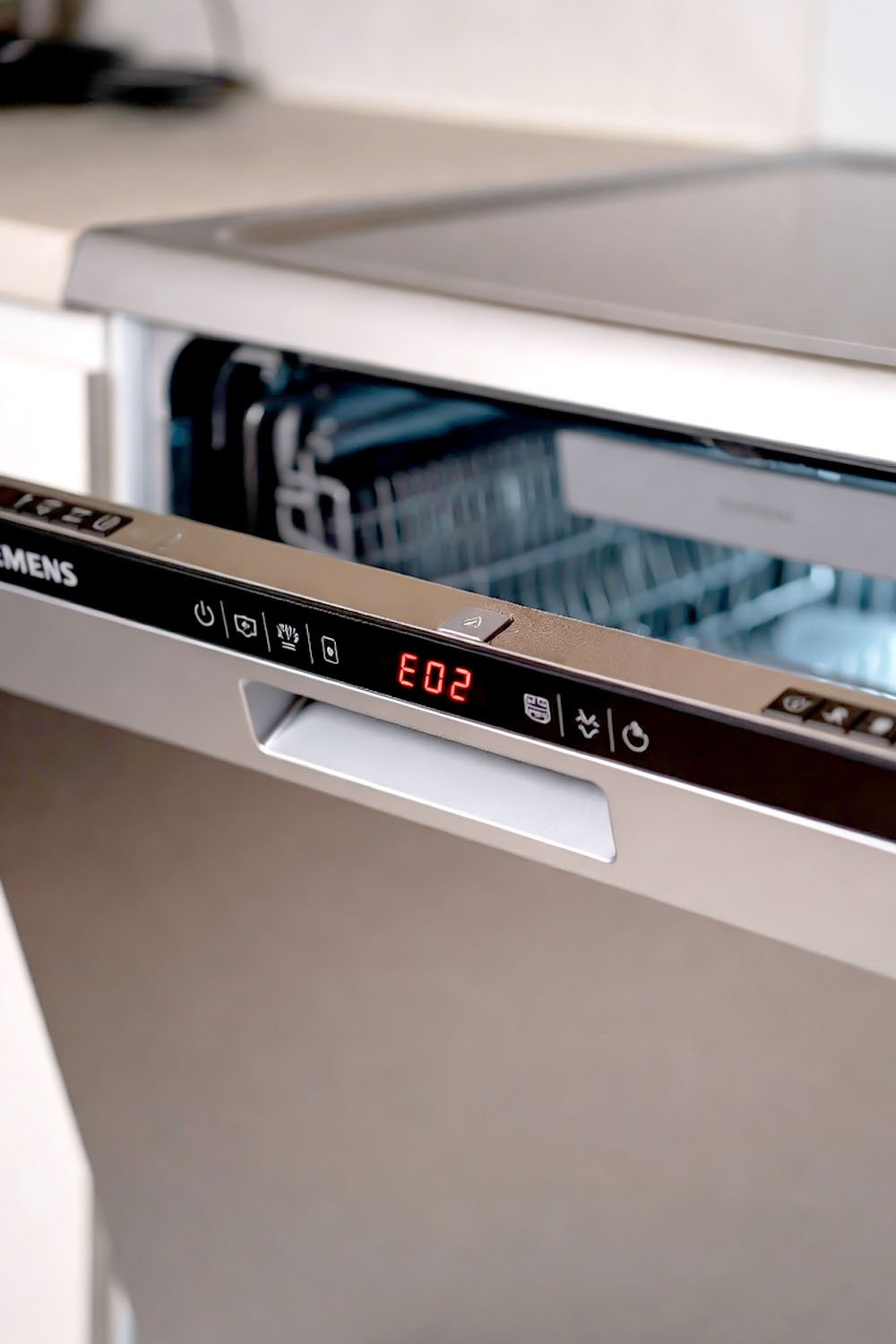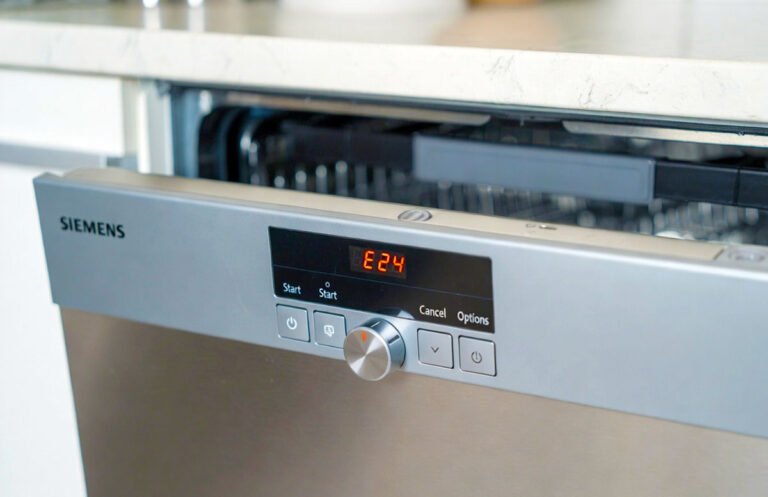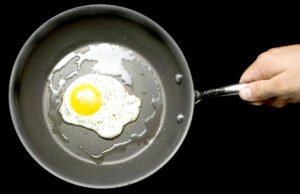As an Amazon Associate, I earn from qualifying purchases at no extra cost to you.
How Long Does a Dishwasher Take to Wash Dishes? Find Out Now!
Have you ever stood in your kitchen wondering, “How long does a dishwasher take to wash dishes?” You’re not alone. Many people get confused because dishwasher times can be different for each load. The quick answer is: most dishwashers take between 1.5 to 4 hours, depending on the cycle. In this article, you’ll learn the real reasons behind these times and how you can make the most out of your dishwasher use.
Understanding Dishwasher Cycle Time
Dishwasher time is not just about pressing a button and walking away. The time it takes depends on different things like the dishwasher model, how dirty the dishes are, what cycle you pick, and even your home’s water temperature. When you press ‘Start’, your machine checks the load size and dirt level. This first check can already take a few minutes.
The most common dishwasher cycles are Normal, Quick, Heavy, and Eco. A Normal cycle usually takes 2 to 2.5 hours. A Heavy or Pots and Pans cycle can go beyond 3 hours. A Quick cycle may take just 30 to 60 minutes, but it may not clean greasy or very dirty dishes properly.
Newer dishwashers often take longer than old ones. That sounds strange, right? But it’s true. New dishwashers use less water and electricity, so they run longer to make up for it. They clean more slowly but more gently, which saves your dishes and energy.
The water temperature matters too. Dishwashers heat water during the wash, but if the starting temperature is very low, it takes longer. Some machines wait until the water is warm enough before starting the cycle. This can add 10 to 20 extra minutes.
Another thing to consider is drying. Some dishwashers use heat to dry dishes. Others use air drying. Heat drying takes longer but dries better. So if your dishwasher includes a long dry time, your total cycle may go past 3 hours.
Smart dishwashers are different. They sense how dirty the dishes are and choose how long to run. These machines might wash fast on a small load and slow on a heavy load. So, if your dishwasher is smart, don’t worry if the time changes every day.
You can also delay the start of your dishwasher. This doesn’t mean it washes longer. It just starts later. People use this to run the dishwasher at night or during cheap energy hours.
Dishwasher makers always give you cycle times in the manual. But these are only estimates. Your machine might run longer based on real use.
So, if your dishwasher is taking 3 hours, it’s not broken. It’s just working hard to clean using less power and water.
- Dishwasher time depends on cycle type, model, and dirt level
- Normal cycles take 2 to 2.5 hours
- Quick cycles take 30 to 60 minutes
- Heavy cycles take 3 to 4 hours
- Newer dishwashers run longer to save energy
- Low water temperature can add more time
- Heat drying adds more time too
- Smart machines change time based on dirt level
Choosing the Right Cycle for the Right Time
Picking the best cycle saves you both time and energy. Many people always pick the Normal cycle without thinking. But that’s not always the best idea. If your dishes are not very dirty, you can use a shorter cycle and save hours.
Let’s say you just had toast and coffee in the morning. You rinse your plate and cup and place them in the dishwasher. You don’t need a heavy wash for that. A quick or light cycle can do the job in under an hour.
But after a big dinner with pots full of sauce and greasy plates, a heavy cycle is the better choice. This can take 3 to 4 hours, but it’s needed to get everything clean. Some dishwashers even have special cycles just for pots and pans.
Eco mode is for people who care more about saving power and water than time. It uses lower temperature water and longer wash time. You can expect the Eco cycle to take over 3 hours in most machines. But it uses less energy, so it’s good for the environment.
The Quick or Express cycle is great for lightly soiled dishes. But it may not dry them fully or clean very greasy stuff. It runs fast, usually 30 to 60 minutes.
Some dishwashers have a Sensor or Auto mode. This mode checks how dirty the water gets during the cycle. If the water is still dirty, it adds more time. If the water looks clean, it may stop sooner. It’s very helpful but not time-fixed.
You can also try Rinse and Hold if you’re not ready to do a full wash. It doesn’t wash completely, but it stops food from drying and sticking. It takes only 10 to 15 minutes and saves time later.
You should check your user manual. Most brands show the time for each cycle. That way, you can plan your time better. Some new dishwashers even show a countdown timer on the display.
When you choose the right cycle, you save time, money, and water. You also keep your dishes in better shape for longer.
- Use Quick wash for lightly dirty dishes
- Use Heavy wash for pots, pans, and greasy items
- Eco cycle saves energy but takes longer
- Rinse and Hold keeps food soft until you wash later
- Sensor cycles adjust time based on dirt level
- Check the manual for cycle times
- Use the right cycle for the right load to save time
How Dishwasher Settings Affect Washing Time
Your dishwasher has more than just cycle options. Settings like Heated Dry, High Temp Wash, and Delay Start also change how long it runs. Each setting adds its own bit of time or saves it.
Heated Dry is a common setting. If you turn it on, your dishwasher will run a fan or heater at the end of the cycle. This takes 20 to 40 minutes more. But it helps dry dishes better, especially plastics that stay wet easily.
High Temp Wash is another setting. It raises the water temperature during washing. This makes grease and stuck food come off more easily. It adds around 10 to 30 extra minutes to the cycle. You may want to use this after cooking meals with lots of oil.
Sanitize option is used to kill germs. It raises the water to 150°F or higher and keeps it there for some time. This setting adds time, usually 20 to 40 minutes more. It’s good if someone in your home is sick or you’re washing baby bottles.
Delay Start is useful for starting the machine at a later time. This setting doesn’t add time to the washing but makes it start hours later. Some people use it to wash dishes during cheaper electricity hours or when they’re asleep.
Some dishwashers also offer Half Load or Zone Wash options. These save time by only cleaning one part of the dishwasher. If you don’t have a full load, use these settings to finish faster.
Extra Rinse setting adds an extra rinse to remove more soap. It adds 10 to 15 minutes but can help if your dishes often come out with spots.
Drying settings can also change the total time. Air Dry uses less energy but may take longer or leave some moisture. Heated Dry is faster but uses more energy.
Every setting you choose changes how long your dishwasher runs. If you want it to finish faster, turn off extra features.
- Heated Dry adds 20 to 40 minutes
- High Temp Wash adds 10 to 30 minutes
- Sanitize setting adds up to 40 minutes
- Delay Start only changes when the cycle begins
- Zone Wash or Half Load saves time
- Extra Rinse adds 10 to 15 minutes
- Choose fewer settings to finish faster
How Dirty Dishes Affect Dishwasher Time
The dirtier your dishes are, the longer the wash might take. Most modern dishwashers can sense how dirty the water is. They change the time based on that. So, if you place dishes with dried food or stuck cheese, it may take longer to clean.
If you rinse dishes before loading, the cycle may run shorter. This is because the dishwasher doesn’t detect much dirt, so it doesn’t need to run longer. But be careful, over-rinsing wastes water. Just scrape off the big food bits.
Hard foods like dried rice or baked-on cheese need more wash time. Greasy pans and oily plates also need more time and hotter water to get clean.
Even how you load the dishwasher matters. If dishes block the spray arms, the machine works harder and may run longer. Stack dishes with space between them. Don’t overload the racks. Water needs to reach all surfaces to clean well.
Some people make the mistake of stacking plates tightly together or placing big pans in the wrong position. This leads to poor cleaning, and sometimes the machine adds more time or repeats part of the cycle.
Also, if your machine is older or not maintained well, it might take longer. Dirty filters or clogged spray arms can make it run slower or less effectively.
If your dishwasher uses a sensor system, it reads the water. If water stays dirty after rinsing, it means dishes are still dirty, so the machine adds more wash time.
- Dirtier dishes need longer washing
- Scraping off food before loading helps reduce time
- Don’t over-rinse and waste water
- Greasy and sticky foods increase cycle length
- Poor loading makes dishwasher work harder
- Clean spray arms and filters to keep time short
- Sensor dishwashers adjust time based on water dirtiness
How Dishwasher Type and Model Matter
All dishwashers are not the same. Older models run faster but use more water and energy. New dishwashers are built to be efficient, so they run longer but save power and water.
Compact dishwashers often have faster cycles because they wash fewer dishes. These models are great for small homes or single people. Most cycles in compact machines finish in 1 to 2 hours.
Full-size dishwashers wash more and take longer. If they have advanced features like sensor washing, drying settings, and high-temp modes, they may take up to 4 hours.
Smart dishwashers with Wi-Fi control and smart sensors often have longer but more accurate cycles. They adjust time depending on the load. If you’re not in a rush, these machines give the best clean.
Portable dishwashers or countertop ones are faster but may not clean heavy messes well. Their wash time is shorter, but you may need to pre-rinse dishes better.
Energy Star dishwashers are built to save energy. They use less hot water and take longer. It’s all about using less power, even if it means washing a bit slower.
Brand also matters. Some brands run faster than others. For example, Bosch dishwashers often take longer but are very quiet. Whirlpool may run faster but a bit louder.
- Compact dishwashers finish faster
- Full-size dishwashers take longer but clean more
- Smart dishwashers adjust time with sensors
- Portable models are quick but may need extra rinsing
- Energy Star models take longer to save power
- Brand and model affect total wash time
- Older dishwashers may be faster but use more power
Tips to Reduce Dishwasher Time
If you’re always in a hurry, there are things you can do to shorten dishwasher time. First, choose the right cycle. Don’t use Heavy when you only need Normal or Quick.
Rinse off thick food before loading. This keeps the wash time short. Don’t overload the racks. Space lets water reach every dish and clean faster.
Clean the dishwasher once a month. Dirty filters slow down washing. Check spray arms too. Remove bits of food and let them spin freely.
Use high-quality detergent. Some cheap brands don’t clean well, making you run the dishwasher twice.
Turn off Heated Dry if you’re okay with some water drops. Let your dishes air dry on the counter.
Use Delay Start at night. This doesn’t make the cycle faster but gives you clean dishes by morning.
Choose Half Load if your machine offers it. It washes only part of the load and takes less time.
Don’t block the soap dispenser. Make sure dishes don’t stop it from opening during the cycle.
- Use the shortest cycle needed
- Don’t overload racks
- Rinse off thick food bits
- Clean filters and spray arms
- Use good detergent
- Turn off Heated Dry to save time
- Air dry dishes on the counter
- Run dishwasher at night for clean dishes by morning
Final Thoughts
Dishwasher time can feel long, but it has a purpose. Every extra minute helps clean your dishes better and use less water and energy. Now that you understand what affects the cycle time, you can plan better and choose the best settings for your needs. Whether it’s a quick rinse or a deep clean, your dishwasher is working hard behind the scenes. Use the tips shared here to save time, energy, and always enjoy sparkling clean dishes.
| Cycle Type | Average Time |
|---|---|
| Normal | 2 to 2.5 hours |
| Quick/Express | 30 to 60 minutes |
| Heavy Duty | 3 to 4 hours |
| Eco Mode | 2.5 to 4 hours |
| Sensor Mode | Changes each time |
| Rinse and Hold | 10 to 15 minutes |
Frequently Asked Questions (FAQs)
Is it normal for a dishwasher to take 3 hours?
Yes, it is normal. Many newer dishwashers are made to save water and energy. To do that, they run longer. A 3-hour cycle may seem long, but it helps clean well using less power. Some dishwashers use smart sensors that adjust the time based on how dirty your dishes are. Also, extra settings like drying or sanitize will add more time.
Can I open the dishwasher while it’s running?
Yes, you can open it, but be careful. When you open the door during a cycle, the dishwasher will usually pause. Steam may come out, and the water could be hot. It’s safe, but don’t keep it open too long. Close the door again and it will continue the wash. Just avoid opening it during drying, or your dishes may stay wet.
Do I need to rinse dishes before using a dishwasher?
No, you don’t need to rinse them fully. But scraping off big food pieces is a good idea. Too much food can block filters and make the machine take longer. Rinsing lightly helps, but don’t waste water. Most modern dishwashers are designed to handle some leftover food without any problem.
Is it better to run the dishwasher at night?
Yes, many people find it helpful. Running your dishwasher at night can save on electricity costs, especially if your area has off-peak hours. Also, you don’t need to wait for the cycle to end. Just load, set Delay Start, and wake up to clean dishes. It also keeps your kitchen quiet during the day.
Can I make my dishwasher cycle faster?
You can, but it depends on your model. Use Quick or Express wash for lighter loads. Turn off Heated Dry and Sanitize options to save time. Keep filters and spray arms clean. If your machine has a Half Load or Zone Wash option, use it when you have fewer dishes. This all helps reduce total cycle time.
Do I need to use Heated Dry?
No, it’s optional. Heated Dry helps dry your dishes faster and better, especially plastic items. But it also adds time and uses more power. If you don’t mind drying dishes with a towel or letting them air dry, you can turn this setting off and save time and energy.
Is it okay to stop a dishwasher mid-cycle?
Yes, it’s okay, but it’s better to avoid doing it too often. When you stop it, it may have to restart or redo parts of the cycle. If you really need to add a dish or check something, open the door slowly and carefully. Just make sure it’s not in the middle of heating or drying.
Can dishwashers get faster with regular cleaning?
Yes, they can. When filters, spray arms, and nozzles are clean, water flows better, and your machine works at its best speed. If parts are blocked, it may take longer to clean dishes or leave them dirty. Clean the inside monthly and remove food stuck in the filter to help your dishwasher work faster.









